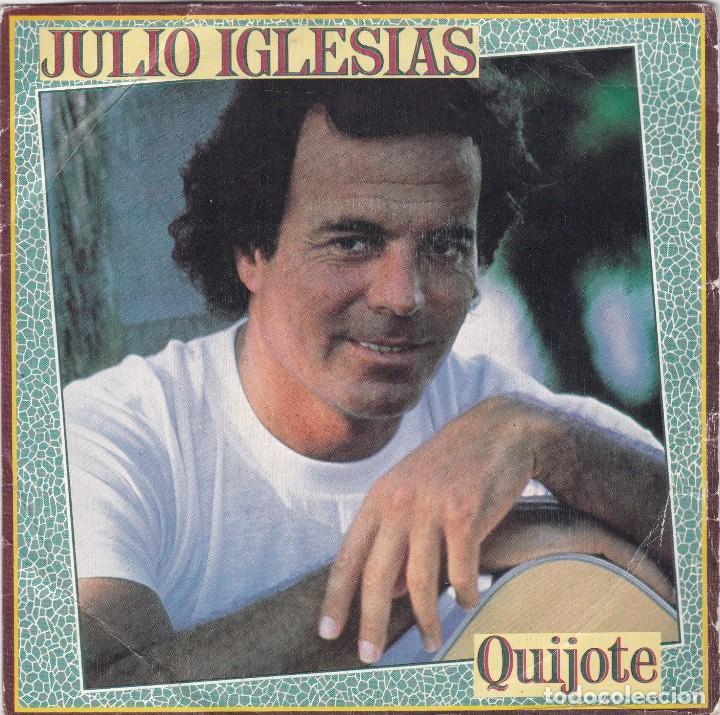Julio Iglesias's "Quijote"
Soy de aquellos que sueñan con la libertad,
Capitán de un velero que no tiene mar.
Soy de aquellos que viven buscando un lugar.
Soy Quijote de un tiempo que no tiene edad.
Y me gustan las gentes que son de verdad.
Ser bohemio, poeta y ser golfo me va.
Soy cantor de silencios que no vive en paz,
Que presume de ser español por donde va.
Y mi Dulcinea, ¿dónde estarás? [...]
In 1982, Spanish crooner superstar Julio Iglesias released his album Momentos. Among the songs on the album was a piece titled Quijote, which conjures up a modern version of the classic literary hero Don Quixote de la Mancha, from Miguel de Cervantes’s novel (1605; 1615). The lyrics describe Quixote traveling through the world alone, thinking of his Dulcinea and “buscando un lugar.” Iglesias also made a music video to accompany the song, in which he leans against the railing at the prow of a boat, with a Spanish flag fluttering beside him. He looks out over the water and sings in a nostalgic, stoic tone.
Quijote demonstrates the fascination that we still have today with the character of Don Quixote, and the way in which we have decided to remember him. The Quixote of the song retains all of the positive features of his literary counterpart; he is mysterious, solitary, and enamored of his far-off Dulcinea. But his numerous, comical defects, which make up the majority of the content and humor of the novel, are noticeably absent. Although his adventures in the novel are full of errors and humiliation, these seem to have been lost somewhere along the way.
There are several ways to interpret the omission of Don Quixote’s faults. Perhaps the most likely is for reasons of pride. Iglesias, himself an icon of Spanish pop culture, evokes the personification of Spanish literary history as a reaffirmation of his own and his audiences’ national identity. It almost does not matter that this Quixote looks nothing like the original; the very act of bringing him into the pop music of a new generation is enough to keep his legacy alive long after his death, just as the “real” Don Quixote wished.
En 1982, el crooner famoso Julio Iglesias lanzó su álbum Momentos. Entre las canciones hay una llamada Quijote, que presenta una versión moderna del héroe literario clásico Don Quijote de la Mancha, de la novela por Miguel de Cervantes (1605; 1615). La letra describe a Quijote navegando solo por el mundo, pensando en su Dulcinea y “buscando un lugar.” Iglesias también hizo un videoclip para acompañar la canción. En él, vemos a Julio Iglesias en un barco blanco, apoyado en la baranda al lado de una bandera española que ondea en el viento. Mira al mar y canta en un tono nostálgico y estoico.
Quijote demuestra la fascinación que todavía tenemos con el personaje de Don Quijote, y la manera en que hemos decidido recordarlo. El Quijote de la canción mantiene todas las características positivas de su equivalente literario; es misterioso, solitario, y enamorado de su Dulcinea lejana. Pero sus defectos numerosos y cómicos, que componen la mayoría del contenido y humor de la novela, están notablemente ausentes. Aunque sus aventuras en la novela están llenas de errores y humillación, parece que estos se han sido perdido con el tiempo.
Hay varias maneras de interpretar la omisión de los defectos de Don Quijote. Tal vez la razón más probable es el orgullo nacional. Iglesias, en sí mismo un ícono de la cultura popular de España, evoca la personificación de la historia literaria española como una reafirmación de la identidad nacional de él y de su audiencia. Casi no importa que este Quijote no se parece nada al caballero original; el acto de reintroducirlo a la música popular de una generación nueva basta para mantener su legado viva muchos años después de su muerte, exactamente lo que el Quijote “real” quería.
-- Sophia Drew


